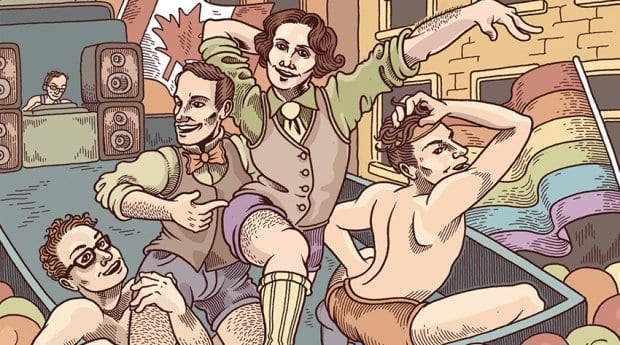In December 1908, more than 160 people gathered in the Ritz Hotel in London, England, to express their appreciation for a dedicated friend of Oscar Wilde. Thirty-nine-year-old Robbie Ross was honoured by an impressive group, including the explorer Martin Conway, Lord Howard de Walden as well as the Duchess of Sutherland, and celebrated literary figures Somerset Maugham and HG Wells. When it came to Ross’s turn, he spoke with his customary self-effacement to the crowd, which included Wilde’s sons Cyril and Vyvyan Holland: “Yesterday evening it was exactly eight years ago since Wilde died. A disciple of Wells, I have always anticipated posterity and never doubted for a single moment that time would readjust those small and greater injustices which ethics pursuing conduct invariably imposes upon art. I did not, however, anticipate that I should be so generously complimented for the fulfilment of a promise which I made to myself at the deathbed of Oscar Wilde.”
Wilde had been sentenced to two years’ hard labour for “gross indecency” on Ross’s 26th birthday, in 1895. While Wilde deteriorated in both mind and body in prison, Ross made it his work to clear up Wilde’s finances, in the hope of enabling him to emerge eventually from prison with a clean slate. Despite raising funds to cover many of Wilde’s debts, however, Ross was unable to save Wilde from bankruptcy.
After his release in 1897, Wilde tried to come to terms with his new, poorer life in France, under the name Sebastian Melmoth, and Ross valiantly juggled personal obligations, poor health and his new role as Wilde’s literary executor. Prison had diminished Wilde’s taste for whimsical comedies, leaving Robbie in custody of two very stern works, De Profundis and The Ballad of Reading Gaol.
Wilde’s prophecy, that the British public would not permit him to live into the 20th century, came true, but Ross continued to promote Wilde’s interests, and those of his two estranged sons. Ross set about acquiring Wilde’s copyrights, determined that the masterpieces would be once again read and performed and that once the royalties had discharged Wilde’s bankruptcy, all subsequent funds would go to Cyril and Vyvyan. The Importance of Being Earnest was revived in London in 1901, as was Salomé in Berlin, and within a few years De Profundis was selling swiftly. Late-Victorian hypocrisy had attempted to stamp out Wilde, but because of Ross’s efforts, Wilde’s work saw a thorough revival.
Though he was working in their interests, Ross did not bond with Wilde’s sons until 1907, when Vyvyan was 20 and studying in London. Ross introduced Vyvyan to many of Wilde’s friends and allies, allowing him to accept who his father had been. Vyvyan met some fascinating people, including Somerset Maugham, whom he sat next to at the dinner in Ross’s honour a year later.
The newspaper thoroughly covered the Wilde scandal; even without Ross’s efforts we would know about him today. However, without Ross’s dedication to securing and shaping Wilde’s legacy, by clearing his debts, reviving his work and guarding his children’s futures, we probably wouldn’t think of Wilde the way we do: as a martyr for gay rights.
More remarkable is that Ross did all he did while sporting a distinctly Canadian accent. Robbie Baldwin Ross was named for his grandfather, the Honourable Robert Baldwin, chief architect of “responsible government” in Canada. His family was one of Toronto’s most prominent. We live in a cynical era, where many feel like Canadian identity is uncertain and treated with scorn. It gives me deep satisfaction to know about somebody like Ross, who was intelligent, noble, a great friend, a gay man with Canadian roots, and the person responsible for giving us Oscar Wilde


 Why you can trust Xtra
Why you can trust Xtra


